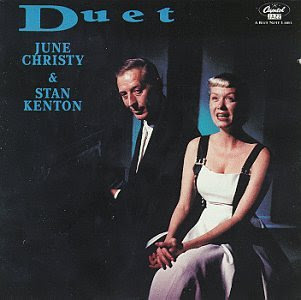Illinois-born singer June Christy was arguably one of the most unique female vocalists to come out of the big band era and first rose to prominence in the mid-1940s as the replacement for Anita O'Day in the popular band led by Stan Kenton at a time when arranger Pete Rugolo (later a close associate of Christy's at Capitol) was writing most of the charts for the orchestra. During her rather brief tenure with the Kenton organization, Christy had an important part in the creation of such hits as "Tampico" and "How High the Moon" and quickly became known for her cool, relaxed approach to the vocal art. Christy went on to have a successful solo career starting in the early '50s, recording great concept albums such as Something Cool and The Misty Miss Christy, among many others that have become pop classics of the era. About ten years after she first joined his band, Christy reunited with former boss Kenton for an LP that stands as one of the most challenging in the careers of both participants. The project, simply entitled Duet and recorded for Capitol over the course of four sessions in May 1955, presents Miss Christy's divinely husky voice, with its astounding ability to convincingly narrate stories in song, sharing the spotlight with Kenton's forceful piano accompaniment, which is afforded plenty of space to shine in its own right throughout the album.
 |
| June Christy on stage at the Hollywood Palladium with the Stan Kenton band. |
The result of this collaboration is a classic, though often neglected, record that combines standards (Cole Porter's "Ev'ry Time We Say Goodbye," George and Ira Gershwin's "How Long Has This Been Going On," Matt Dennis's "Angel Eyes") with under-recorded gems (Joe Greene's "Come to the Party," Bobby Troup's "Just the Way I Am") that really sound special in the hands—and pipes—of the duo of Kenton and Christy. Benny Carter's "Lonely Woman," with its powerfully dramatic undertones, and "Baby, Baby All the Time," a song that came to Miss Christy's attention via her much-admired Nat King Cole, are among the many high spots of the album, the latter even prompting the singer to do a little scatting. In his Biographical Guide to the Great Jazz and Pop Singers, critic Will Friedwald notes that the album could well have been inspired by similar collaborations between Ella Fitzgerald and Ellis Larkins, and suggests that "the starkness of the accompaniment and the exposed, vulnerable nature of Christy's singing effectively foreshadow Tony Bennett and Bill Evans twenty years later." Though the 1993 Capitol CD reissue has been out of print for a while, this highly recommendable album has been included recently in a four-CD collection of Christy LPs from the '50s released by the European label Real Gone. The way to go, however, is still the Capitol reissue, since it boasts not only fine liner notes by Mr. Friedwald himself, but also two tracks ("Prelude to a Kiss" and the lovely "Thanks for You") that were left out of the original LP release.



No comments:
Post a Comment